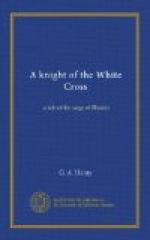At daybreak on the 9th of June, a great number of vessels and boats, crowded with soldiers, bore down on St. Nicholas. As they approached, every gun on the fortifications that could be brought to bear upon them opened fire; but in a dense mass they advanced. Some made their way to the rocks and landed the soldiers there; others got alongside the mole; but the majority grounded in the shallow water of the harbour, and the troops, leaping out, waded to the foot of the breach. On its crest D’Aubusson himself had taken up his station. Beside him stood Caretto, and around them the most distinguished knights of the Order. With wild shouts the Turks rushed up the breach, and swarmed thickly up the ruined masonry until, at its summit, they encountered the steel clad line of the defenders. For hours the terrible struggle continued. As fast as the head of the Turkish column broke and melted away against the obstacle they tried in vain to penetrate, fresh reinforcements took the place of those who had fallen, and in point of valour and devotion the Moslem showed himself a worthy antagonist of the Christian. It was not only at the breach that the conflict raged. At other points the Turks, well provided with ladders, fixed them against the walls, and desperately strove to obtain a footing there. From the breach clouds of dust rose from under the feet of the combatants, mingling with the smoke of the cannon on the ramparts, the fort, and Turkish ships, and at times entirely hid from the sight of the anxious spectators on the walls of the town and fortress, and of the still more numerous throng of Turks on St. Stephen’s Hill, the terrible struggle that continued without a moment’s intermission.
The combatants now fought in comparative silence. The knights, exhausted and worn out by their long efforts beneath the blazing sun, still showed an unbroken front; but it was only occasionally that the battle cry of the Order rose in the air, as a fresh body of assailants climbed up the corpse strewn breach. The yell of the Moslems rose less frequently; they sacrificed their lives as freely and devotedly as those who led the first onset had done; but as the hours wore on, the assurance of victory died out, and a doubt as to whether it was possible to break through the line of their terrible foes gained ground. D’Aubusson himself, although, in spite of the remonstrances of the knights, always in the thickest of the fray, was yet ever watchful, and quickly perceived where the defenders were hotly pressed, and where support was most needed. Gervaise fought by his side, so that, when necessary, he could carry his orders to a little body of knights, drawn up in reserve, and despatch them to any point where aid was needed. The cannon still continued their fire on both sides. A fragment of one of the stone balls from a basilisk struck off D’Aubusson’s helmet. He selected another from among the fallen knights, and resumed his place in the line. Still the contest showed no signs of terminating. The Turkish galleys ever brought up reinforcements, while the defenders grew fewer, and more exhausted. During a momentary pause, while a fresh body of Turks were landing, Gervaise said to the grand master,




